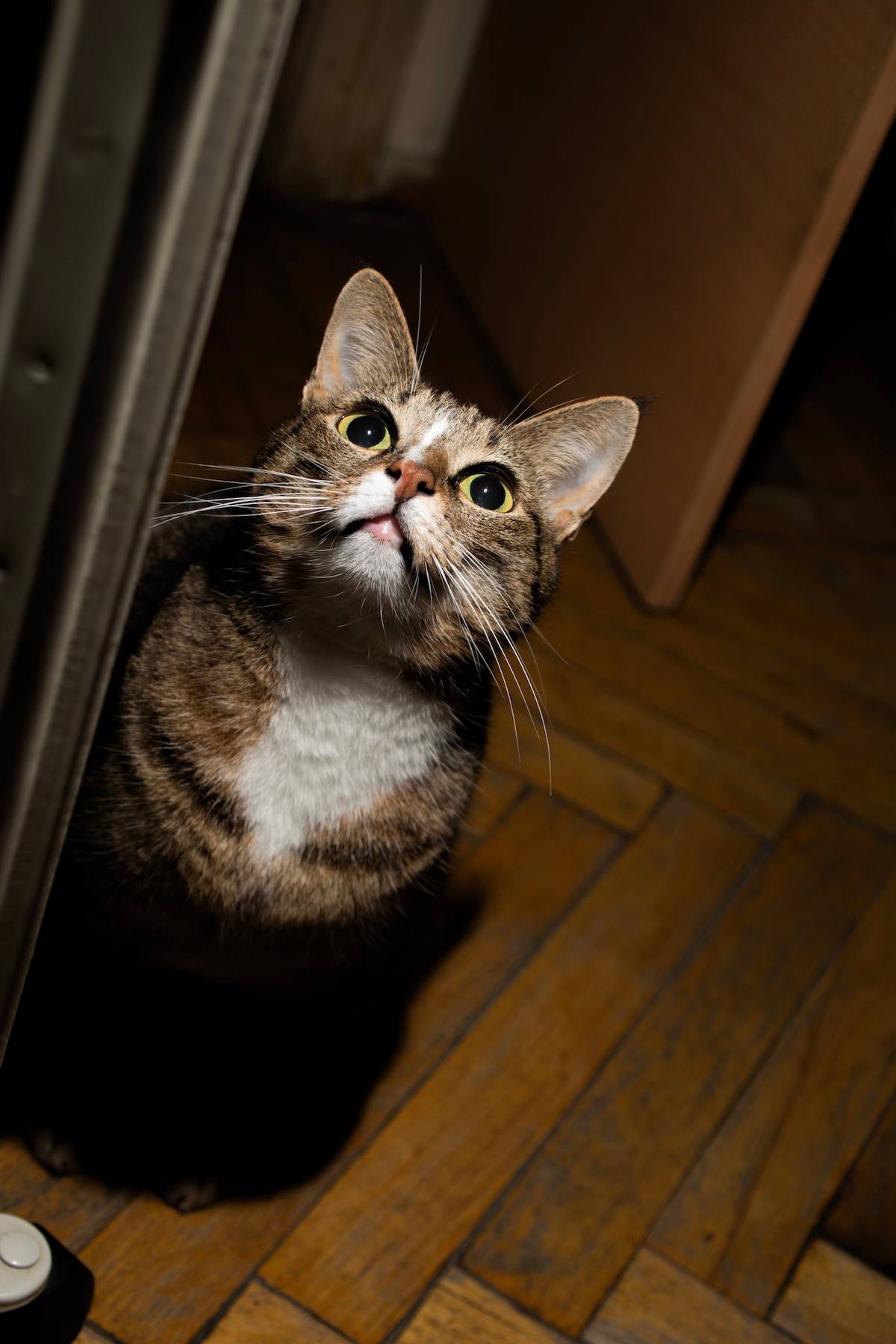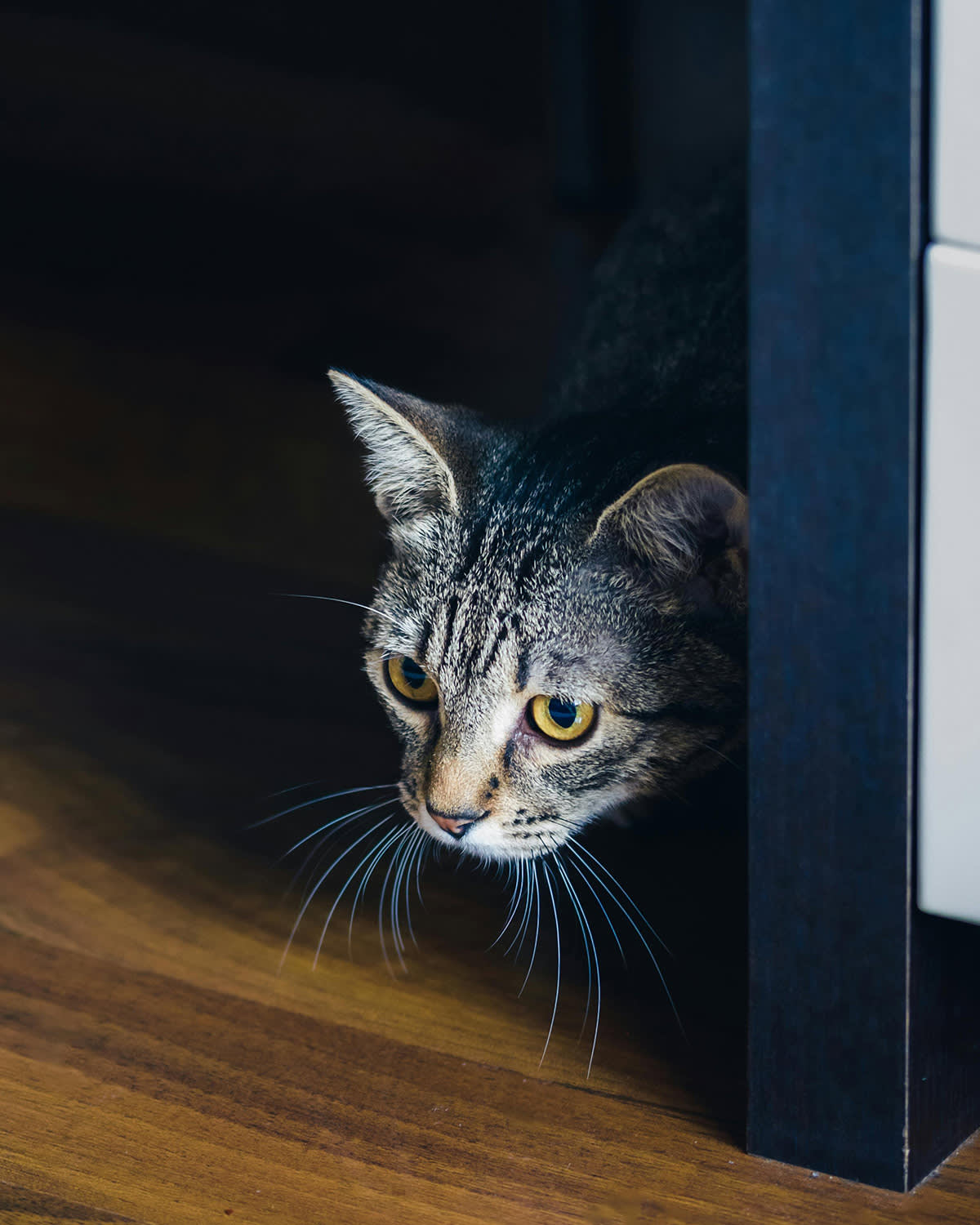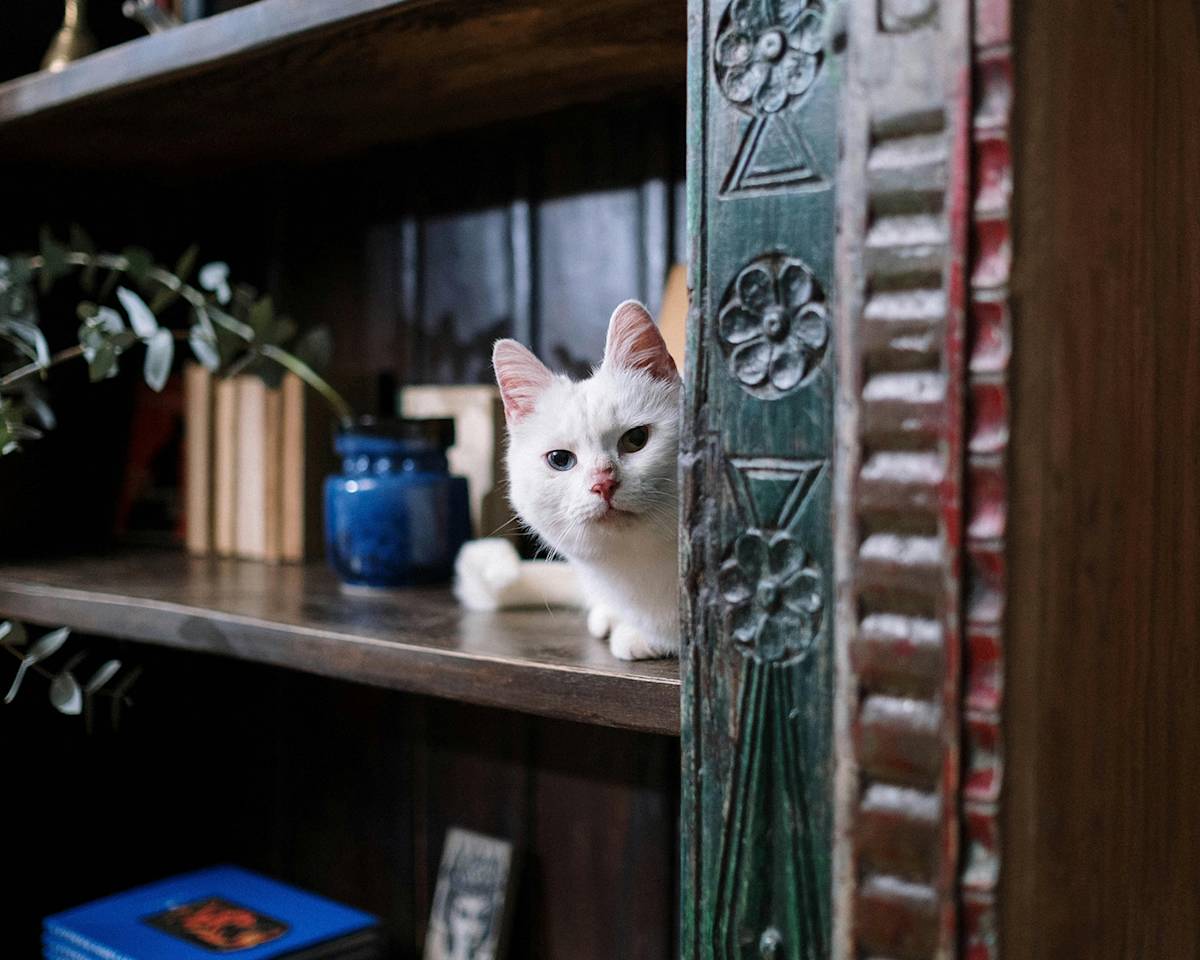The Ultimate Cat Parent Guide to Calming Cats During Fireworks
Fireworks are fun for you, not for your feline friend

Share Article
If you’ve ever spent Bonfire Night, Diwali or New Year’s Eve watching your cat sprint under the bed like they’re trying to escape a war zone, you’re not alone. While we might enjoy the spectacle, cats are often terrified. The loud, unpredictable noises are startling enough, but add in flashes of light, vibrations and strange smells of gunpowder and smoke, and it becomes sensory overload. Their nervous system flips on to high alert, leaving them feeling unsafe in their own home.
The 2024 PDSA Animal Wellbeing (PAW) Report found that 30 percent of cat parents say their cat is afraid of fireworksopens in new tab, but emotional well-being isn’t the only concern. Fear can lead to split-second decisions that put cats at serious risk of getting stuck behind heavy furniture, becoming trapped inside cavity walls, or bolting through an open door and going missing. The dangers multiply for outdoor cats – they may startle and run into traffic or, in heartbreaking cases, be deliberately injured by fireworks.
Why fireworks are a problem for cats
Cats have incredibly sensitive hearing. What we register as a distant pop can sound like an explosion to them, instantly triggering a fear response. Add in the unpredictability – sudden bangs out of nowhere, random intervals between bursts, or neighbours lighting fireworks days early (or late) because Bonfire Night falls midweek – and you’ve got a recipe for full-on feline panic. Firework-related fear, anxiety and stress may result in a cat hiding for extended periods, loss of appetite, house soiling, over-grooming, or even aggression towards people or other animals.
A 2024 study published in Veterinary and Animal Science confirmed just how stressful fireworks can be for catsopens in new tab. During or immediately after fireworks, over 75 percent hid, 64 percent bolted, and most showed jumpiness and skittish head movements. When a cat hears fireworks, their nervous system goes into overdrive – their heart races, muscles tense and adrenaline floods their body. In the study, 55 percent sought out eye contact with their pet parent and 43 percent went to them for comfort – signs that suggest they felt unsafe in their core territory.
So, let’s talk about what you can actually do, right now and in the long term, to help your cat remain calm and safe throughout fireworks season.
How to help your cat deal with fireworks
Create a safe indoor sanctuary
Prepare early, ideally a few weeks before fireworks season, to give your cat time to adjust. Start by building your cat their own personal fortress of calm. Pick a quiet, familiar room. If you have a space with no outside-facing windows, that’s ideal, but if not, close the curtains or blinds to muffle sounds and block out any bursts of light. Add a choice of safe retreats; a cosy cat bed placed beneath a bed or inside a cubby hole, an igloo bed, a chair with blankets draped over it, or even an upturned cardboard box with two access holes cut into adjacent sides will create a dark, secure den. Ensure your cat’s litter box, water and food are close by, so they don’t have to leave their safe zone.
Plug in a calming pheromone diffuser and spray beds or blankets with pheromone spray. These products mimic the F3 facial pheromones deposited by cats when they rub their faces on furniture and walls. They make the space feel familiar and comforting, which can help reduce anxiety. For the best effect, start using them a week or so before the fireworks begin and then continuously throughout the season.
Give them the freedom to come and go as they please. Some cats seek comfort from their pet parents, while others prefer to be left alone. If they’re only showing mild signs of anxiety, bringing out their favourite toys or giving them a food puzzle can be a great distraction. The key is to be observant and responsive to their behaviour. Avoid trying to coax out or physically comfort them if they’re anxious or fearful, let them come to you on their own terms. Attempts to pick them up or pet them can backfire, increasing their stress and potentially resulting in scratches or bites if they feel threatened.
Reduce the impact of firework noise
Shut windows and doors to block external noise. Closing off any unused rooms, drawing thick curtains and rolling up towels or blankets to place at the bottom of closed doors can help with soundproofing. To mask the crackles, whizzes and bangs, turn on the TV or play brown noise (brown noise is deeper and softer than white noise, which can have aversive tones that sound like hissing) or calming music. A 2021 study published in the Journal of Feline Medicine and Surgery suggests that classical music and music composed specifically for cats can be beneficial during stressful eventsopens in new tab.
Keep your routine going
Seasonal celebrations might throw you off schedule, but try not to mess with your cat’s routine. They thrive on predictability, so any sudden changes can increase anxiety. Feeding and playing with them at the usual times will give them a sense of normality and control. Try to avoid any major household disruptions, such as building work or hosting parties at home, during fireworks season.
How to keep your cat safe on fireworks night
Mark the dates of local fireworks displays in your calendar and ask your neighbours for a heads-up if they’re planning a private party, so that you can keep your cat in overnight. Call them inside well before dusk, lock the cat flap and securely close external windows and doors.
Ensure your cat is microchipped and that your contact details are up to date – this is crucial if they do escape. If your cat wears a collar (which should be breakaway, for safety), you could also consider attaching a GPS or Bluetooth tracker.
How to stop your cat being scared of fireworks
Consider preparing your cat in advance for next year using desensitisation and counter-conditioning. This isn’t about flooding your cat with firework sounds and hoping they get used to it. It’s a slow, structured process designed to change your cat’s emotional response.
Start months ahead, giving you enough time to expose them to the trigger gradually. Start by playing recorded firework sounds at a barely audible volume. If they don’t react, you’re in the right zone. If they freeze, flinch or run away, it’s too loud – turn it down. Every time you play the track, pair it with something they love, like delicious treats or a favourite toy. The goal is for the noise to predict these good things. If they remain calm and relaxed, slowly increase the volume just a little.
Go slow and steady. This process is likely to take weeks, if not months. Be super observant of their body language and behaviour. If they show any signs of stress or anxiety, such as dilating pupils, a twitching tail, rotated and flattened ears, raised fur along the spine or tail, a crouched body position, or staring at the speaker, immediately turn the recording off and go back a step next time. If the noise is too much for your cat even at the lowest volume, try playing it from another room, wrapping the speaker in a piece of fabric to muffle the sound, or seeking guidance from a qualified behaviourist who can create a structured plan specifically designed for your cat.
Other things to consider on fireworks night
If you have a multi-cat household, be alert for signs of tension. Stress can make cats more reactive, triggering conflict. Make sure there’s at least one safe retreat per cat, plus one extra, so they have the option to hunker down together or get cosy in their own private space.
Never scold or punish a frightened cat. It sounds obvious, but if your stressed cat pees on the carpet or swipes at their littermate or the dog, yelling or reprimanding them won’t help; it will just reinforce their fear and damage their relationship with you. It’s a sign that they’re struggling and need more support.
If your cat’s fear or anxiety feels unmanageable, it doesn’t mean you’re doing something wrong. Some cats experience extreme sound sensitivity due to their temperament or past trauma. Talk to your vet – they may recommend calming nutraceutical supplements or prescribe short-term medication to help reduce your cat’s arousal levels and prevent them from getting stuck in survival mode.
Cat and fireworks: the bottom line
Supporting your cat through fireworks season isn’t about building a soundproof bunker or smothering them with attention. It’s about tuning into what they really need - predictability, a calm environment, and a safe space where they feel in control. Be proactive. Create a sanctuary they can retreat to, make sure their microchip details are up-to-date, and start desensitisation and counter-conditioning training well before the first bang.
Fireworks don’t have to be traumatic. With early planning, thoughtful preparation, and a clear understanding of your cat’s individual needs, you can significantly reduce their stress and keep them safe.
Resources
Paz, J.E., da Costa, F.V., Nunes, L.N., Monteiro, E.R. and Jung, J. (2021). Evaluation of music therapy to reduce stress in hospitalized cats. Journal of Feline Medicine and Surgeryopens in new tab, 24(10), p.1098612X2110664. doi:https://doi.org/10.1177/1098612x211066484.
PDSA (2024). The PAW Report. [online] www.pdsa.org.uk. Available at: https://www.pdsa.org.uk/what-we-do/pdsa-animal-wellbeing-reportopens in new tab.
van Herwijnen, I.R., Vinke, C.M., Arndt, S.S. and Roulaux, P.E.M. (2024). Firework aversion in cats and dogs as reported by Dutch animal owners. Veterinary and Animal Scienceopens in new tab, [online] 26(26), p.100402. doi:https://doi.org/10.1016/j.vas.2024.100402.

Claire Stares, BA (Hons), MA, PG Dip Clinical Animal Behaviour
Claire Stares is a feline behaviourist with a PG Diploma in Clinical Animal Behaviour from the University of Edinburgh Royal (Dick) School of Veterinary Studies. She’s dedicated to helping guardians and their cats overcome behavioural problems and thrive so that they can enjoy life together. A cat lady since babyhood (her first word was cat!), she has over 20 years of experience living and working with cats in homes, rescue environments and veterinary practices. A passionate advocate for training cats for enrichment and cooperative care, she practices what she preaches with her five cats: three rescued Domestic Shorthairs, Bimble, Bertie and Katie, a Siamese called Daisy Mae, and a Maine Coon named Horatio. When there isn’t a feline companion asleep on her laptop, she writes books and articles for various publications.


